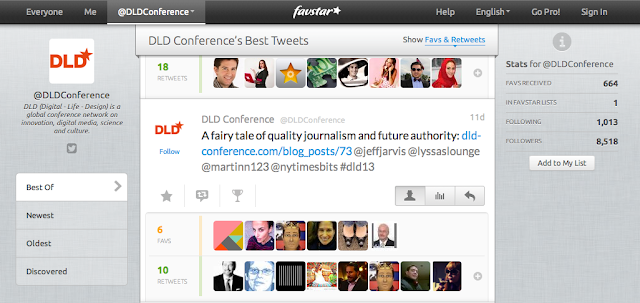A Fairy Tale of Quality Journalism
5:45 PM
by Beatrice Jeschek
Photo: Jeff Jarvis, Martin Nisenholtz, Arthur Sulzberger, Katharina Borchert, Ian Osborne (fltr) David Michael Barnwell
Photo: Jeff Jarvis, Martin Nisenholtz, Arthur Sulzberger, Katharina Borchert, Ian Osborne (fltr) David Michael Barnwell
Once upon a time, journalists were heroes," Steffi Czerny introduced the prestigious journalism panel at the Digital Life Design Conference 2013. "That was long before social networks were challenging the authority of established media."
It seems as if traditional journalism has been undergoing an identity crisis ever since the multitude of online voices are growing louder. "We have to make better use of those new sources of information," said Arthur Sulzberger, Chairman and Publisher of The New York Times.
It's a power shift that puts the old media into a corner. They have to react, make use of what's out there, their new audience. "I'm fascinated by the new forms of authority," Martin Nisenholtz admitted. "The audience actually becomes the editor of the authorities." Nisenholtz, who had left The New York Times in 2011 after sixteen years as the driving force behind the digital strategy, said it's most crucial to bridge new and old media.
"Actually, we have to work very hard to keep our authority," said Katharina Borchert, CEO of Spiegel Online. New forms of high quality advertisement online, native ads seaminglessly put into the news, threaten the former separation of contents: marketing vs. journalism. One has to fight for the attention of the reader and keep it.
Why follow an authority when you can curate your own content? Jeff Jarvis, blogger, j-school prof and author of 'What Would Google Do", described the new media as a platform. A scenery of anarchistic content managers pops into my mind when he speaks about how to leave the urge to be a mediator behind. His advice: become a platform builder and add value on top of that, in form of varifying facts for instance.
Is that really all there is what established - one could say admired - media like The New York Times and Spiegel can do in order to stay relevant? Digital subscriptions become more and more important, Sulzberger said, and with it the engagement with the audience. The importance moreover lies in the watchdog role, keeping an eye of what is happening in public sectors like politics. However, they need to find a sustainable economic model for quality journalism.
The key to this, the panelists agree, may well lie within the use of social platforms itself as a new form of spreading content. Instead of blaming networks like Google, Twitter and FB, traditional media should be focusing on what they are best at: producing reliable well-researched information across borders, like China and India, with nationally relevant content.
"We should be using the power we still have to support journalists in the field," Katharina Borchers closed the session. "We should get up and do our damn best and deliver," so that the promise of quality reporting by established media may hold.
This article was written for DLD Media and first published 20/01/13 on dld-conference.com. Click here for the link. The #DLD13 conference live coverage also included sending out Tweets about every session, interacting with the audience, interviewing speakers and posting highlights on Facebook.








Kevin+Mazur_640x233px.jpg)

Todd-Kaplan_659x395px.jpg)



0 comments